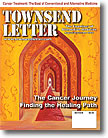The US National Library of Medicine (NLM)
describes itself as the "world's
largest medical library” and claims to provide information in "all
areas of biomedicine and health care." Yet that statement is demonstrably
untrue. The NLM does not include the Journal of Nutritional
and Environmental Medicine; Medical
Veritas;
Fluoride; the Journal
of American Physicians and Surgeons; or
the Journal of Orthomolecular Medicine (now
in its 30th consecutive year of publication) in the electronic index
known
as Medline. Why not?
Medline is the preeminent online search engine for medical publications.
With Medline, you can access abstracts of millions of scientific papers
instantly
from your computer. The public loves Medline; nearly two million people use
it every day. This excellent, free service is made available by the US Department
of Health and Human Services/National Institutes of Health – in other
words, through tax dollars. Generally, the service is money well spent, until
you go searching, say, for megavitamin therapy research papers. Then you will
find that you can't find all of them. That is because of selective indexing.
What are the consequences of such exclusion? First, such selective indexing
prevents the public from learning about all the scientific research and clinical
reports that demonstrate the effectiveness of megavitamin (orthomolecular)
therapy. It also greatly hampers professionals by preventing them from seeing
pro-vitamin studies. Have you ever wondered why so many doctors simply do not
know about vitamin therapy? Well, wonder no longer. You cannot study what you
cannot find; you cannot find what is not indexed. There is little difference
between freedom of speech and freedom of access. If people cannot find it,
they cannot read it. These days, you don't have to burn literature; just make
it hard to access.

Selection Bias
While the tax-supported NLM does not see fit to index the Journal
of Orthomolecular Medicine, it does choose to index Time magazine. Believe it or not, there
are no fewer than 1,260 indexed articles on Medline just from Time magazine.
I found another 1,136 Medline listings for Newsweek. Time nor Newsweek are
not medical journals. Neither are Consumer Reports or Reader's
Digest,
and, yes, they too are indexed by Medline.
How did this happen?
To this day, Medline's indexing decisions are made by a Literature Selection
Technical Review Committee, whose members are appointed by NLM. This committee
decides for you what you may or may not have access to. And the process of
deciding what will or will not be indexed is done in secret. There are no public
hearings.
What Does Medline Choose to Index?
At Medline, in the "Search PubMed for" box, type in "flatulence" and
you will get 1,233 indexed citations. Here are some additional topics and titles
that Medline also indexes:
- Increasing the portion size of a packaged snack increases
energy intake in men and women. (Appetite. 2004)
- How dogs navigate
to catch Frisbees. (Psychol. Sci. 2004)
- Olfactory responses and
field attraction of mosquitoes to volatiles from Limburger
cheese and human foot odor. (J Vector
Ecol.
1998)
- Staring at one side
of the face increases blood flow on that side of the face. (Psychophysiology.
2004)
- Rhinotillexomania (nose-picking): psychiatric disorder or
habit? (J Clin Psychiatry. 1995)
- An objective evaluation of the
waterproofing qualities, ease of insertion and comfort of commonly
available earplugs. (Clin Otolaryngol.
2004)
- Effect on tipping of barman drawing a sun on the bottom of customers'
checks. (Psychol Rep. 2000)
- Espresso kiosks can be profitable
addition to hospital foodservice. (Health
Foodserv Mag. 2000)
Yes, it's true: All the above are duly indexed
by the NLM's Medline. They may instantly accessed, from anywhere in
the world, with a few
clicks
of the mouse.
If Medline indexes what might quite fairly be called "unique" studies,
it should at the very least also index two-time Nobel Prize winner Linus Pauling's
eight nutritional papers published in the Journal
of Orthomolecular Medicine,
four of which appeared in a single year (1991). It is absurd that the NLM,
which has indexed no fewer than 117 papers by Linus Pauling, excludes equally
valuable work by Pauling simply due to where that work appeared. How can an
author's work be significant if published in one journal, but not even worth
mentioning if published in another?
Medline has steadfastly refused to index the Journal
of Orthomolecular Medicine for three decades. Let it now be said: The emperor has no clothes. The National
Library of Medicine/Medline is biased.

Andrew W. Saul is Assistant Editor of the Journal
of Orthomolecular Medicine and is the author of the books Doctor
Yourself: Natural Healing that Works and Fire
Your Doctor! How to be Independently Healthy. His
peer-reviewed natural healing website, http://www.doctoryourself.com,
receives over 35,000 hits per day. You can read papers from the Journal
of Orthomolecular Medicine free of charge at http://orthomolecular.org/library/jom.
Andrew W. Saul
drsaul@doctoryourself.com
www.doctoryourself.com
Condensed and reprinted with permission from
Saul AW. Medline bias.
J Orthomolecular Med. 2005; 20 (1):
10-16.
|




